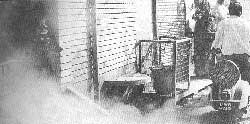Leading the way to brain damage
 LEAD is the number one environmental threat to children in the US. However, in India, lead is only one of the major environmental threats to children in overcrowded urban areas, which have high traffic density.
LEAD is the number one environmental threat to children in the US. However, in India, lead is only one of the major environmental threats to children in overcrowded urban areas, which have high traffic density.
Lead is used in petrol to improve its octane rating. In most of the industrialised world and in some developing countries, steps have been taken to cut down the lead content in petrol. Countries like Sweden and the US have even succeeded in removing most of it.
However, the scenario is vastly different in India. Let alone initiating steps to remove lead, we have not even seriously thought about the problem. Lead disrupts some enzymes that are useful to the functioning of the brain and other cells. Though lead in the blood can be removed, the lead that is absorbed in a child's brain remains there forever. But research in the US in the past 10 years has conclusively proved that even a low level of lead in the blood can lead to mental retardation and learning disabilities among children.
In the '70s, if one decilitre of blood contained 30 micrograms of lead, it was considered to be a case of lead poisoning. Later, 25 micrograms were considered unsafe and now, research shows that even 10 micrograms may be unsafe. We will have to keep in mind that these. levels are appropriate for children in the more developed countries, where they get a more balanced diet. For malnourished Indian children, the minimum level may be even lower.
Three years ago, the Mysore Consumers' Council organised a campaign to educate the citizens of Mysore on the hazards of lead in petrol. About 10,000 pamphlets were distributed and newspapers gave extensive coverage to the campaign. Motorists were requested not to buy petrol for one day. They were also asked to participate in a silent march through the city.
However, only five persons participated in the demonstration. This clearly showed the people's indifference to a major environmental danger, either out of ignorance or cynicism.
Once, during a meeting of consumer activists in Calcutta in 1991, 1 asked Maneka Gandhi why as environment minister, she had not taken steps to ban leaded petrol. According to her, she did try but failed because the cost was prohibitive and the petroleum ministry did not cooperate.
Activism pays Despite having similar problems, how did other countries succeed? Sweden was the first country to introduce unleaded petrol. After a few years, despite strong objections from the refining industry, the US took steps to ban leaded petrol. Since the mid '80s, western Europe and Japan have succeeded in reducing the lead content in petrol. In all these countries, environmentalists played a key role in convincing the government to enact laws to remove lead from petrol.
In India, all refineries are owned and operated by the government. Yet, we are unable to take the right decisions. For industrialised countries, the cost of removing lead from petrol has been very high, but in India, it is relatively low because we do not need high-power petrol with high octane ratings.
Our consumption of petrol in 1993 was 3.8 million tonnes. To convert all of it into unleaded petrol would Cost about Rs. 350 crore a year. Another Rs 350 crore upgrade refining capabilities in octane ratings. The cost would go up by 90 paisa per litre.
This is indeed a small price to pay if we take into account the benefit of preventing mental retardation in children. Being involved with more esoteric subjects like global warming and ozone depletion, our loaders have little time for mundane subjects like producing unleaded petrol. Or, are we waiting for instructions-from our sutradhar (prompter), the World Bank?
Bhamy V Shenoy is associated with the Mysore Consumers'Council.
Related Content
- Flint's 'toxic soup' polluted water worse for children than thought, doctor says
- City anchor: City hospital study finds high iron deficiency in newborns
- Lead-based paints can cause brain damage: Experts
- Rampant food adulteration in Mysore
- Banned in US, ek chutki sindoor still going strong in India
- BYTES
